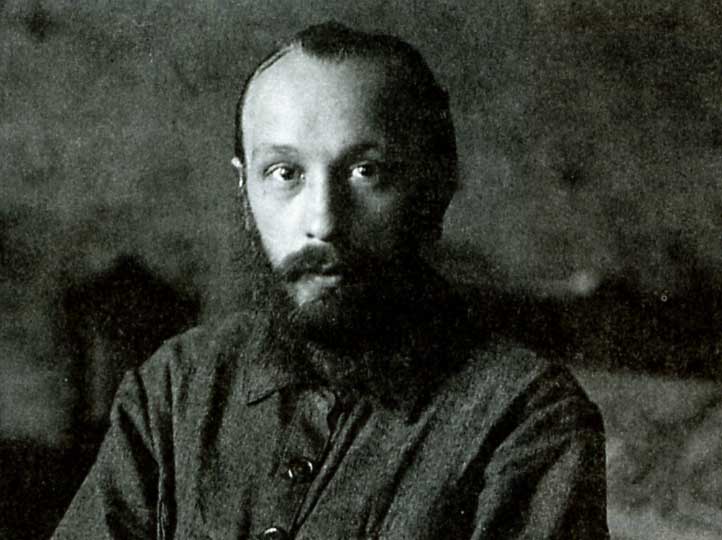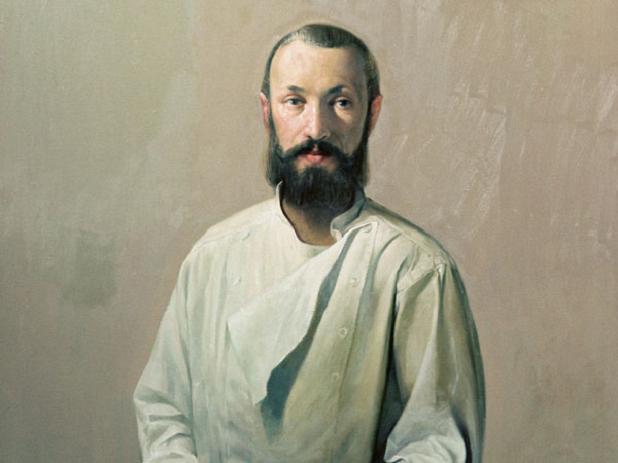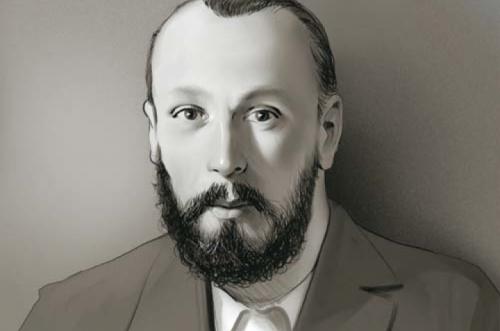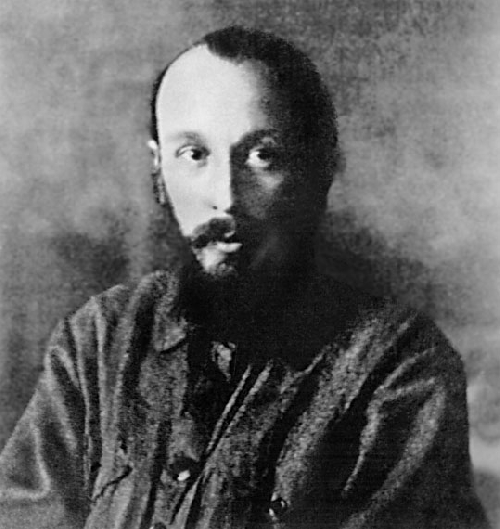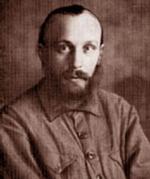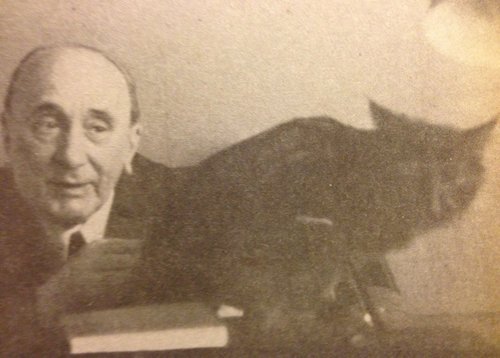Mikhail Bakhtin
Mikhail Mikhailovich Bakhtin (Russian: Михаил Михайлович Бахтин; scientific transliteration Mikhail Bakhtin Michajlovič; * 5 Novemberjul / November 17 1895greg in Oryol, .. † March 7, 1975 in Moscow) was a Russian literary critic and art theorist. His largely emerged in the 1920s and 1930s work on text theory, dialogue, chronotope and intertextuality deployed only since its rediscovery in the 1960s, its effect on literature, philosophy and media studies. Today Bakhtin is considered one of the most important literary theorists of the 20th century.
Life
Bakhtin grew up in Orel, Vilnius and Odessa. He studied, together with his older brother Nikolai Bakhtin (1894-1950), in Odessa and Saint Petersburg. From 1918 he worked as a teacher in Newel and moved in 1920 to Vitebsk, where he married in 1921 Yelena Alexandrovna Okolowitsch ( 1901-1971 ). Since 1924 he lived in Leningrad.
In the 1920s, Bakhtin belonged to a (now - as Bakhtin circle labeled ) Leningrad circle of literary theorists. Many of the essays in this circle created at that time, so among other things, Pavel Medvedev (1891-1938) and Valentin Woloschinow (1895-1936), are under strong influence of Bakhtin's ideas. Bakhtin 's works of this period were published for the most part only since the 1960s. These included his formalism essay The problem of content, material and form in verbal art work ( Проблема содержания, материала и формы в словесном художественном творчестве, 1924) and his study author and hero in aesthetic activity ( Автор и герой в эстетической деятельности, 1924 - 27). Caused a sensation in his 1929 published book Problems of Dostoevsky's Art ( Проблемы творчества Достоевского ). Bakhtin developed in the literature in the Western popular to this day thesis that the basic structural principle of Dostoevsky's great novels in polyphony and dialogism there.
End of 1929, Bakhtin was exiled by Stalin after Kustanai in Kazakhstan, where he worked as an accountant until the mid- 1930s. From 1936 he lived (with interruptions ) in exile in Mordovia Saransk, where he worked as a teacher at the Pedagogical Institute until his retirement in 1961.
Despite the adverse circumstances of the 1930s, the period of his exile, and the Stalinist terror Bakhtin was productive phase: He began his work ( романе в Слово 1934 /35) to the novel theory that the word in the novel in the essays, forms of time and chronotope in the novel ( Формы времени и хронотопа в романе 1937 /38), from the history of the novel word ( Из предыстории романного слова, 1940) and epic and novel. About the Methodology of the novel research ( Эпос и роман. О методологии исследования романа, 1941) resulted. In addition, he wrote 1936-1938 a book about the history of the Bildungsroman and its significance for the development of realism. The manuscript already accepted by the publisher burned in 1941 during the German invasion of the Soviet Union, he used the remaining with Bakhtin preliminary studies ostensibly as cigarette paper during the war; However, some fragments have been preserved and published later.
1940 Finally, he handed the Moscow Maxim Gorky Literature Institute, a his famous Rabelais text as a dissertation. This only in 1965 in a modified form as Творчество Франсуа Рабле и народная культура средневековья и Ренессанса (. Rabelais and his world popular culture as counter-culture ) published work was the center of a scientific controversy in the 1940s; only in 1951 was awarded the title of Bakhtin for candidates of sciences (equivalent to a German doctorate ). In the study, Bakhtin developed the cultural and historical " concept of carnivalization ": The Carnival as a valve in a society, as tolerated taboo and important part in the embossed patterns and conventions of solid culture of the Middle Ages. The all layers detected taboo helps that the boundary between high and popular culture is temporarily suspended.
Among the most important incurred after 1945 works Bakhtin include the essay problems of speech genres ( Проблемы речевых жанров ), he probably around 1953/54, in response to the reorientation of Soviet linguistics after Stalin's publication Marxism and the questions of linguistics ( Марксизм и вопросы языкознания, 1950) wrote, as well as the problem of the text ( Проблема текста в лингвистике, филологии и других гуманитарных науках. Опыт философского анализа, 1959-61 ).
1963 published Bakhtin extended and altered second edition of his Dostoevsky book ( now under the title Problems of Dostoevsky's Poetics, Проблемы поэтики Достоевского ), and in 1965 he published his Rabelais plant in pressure. It is only since that time, his groundbreaking works were received increasingly in France and the United States.
From May 1970 Bakhtin and his wife lived in a retirement home in Moscow, where he died in 1975.
Works
- Проблемы творчества Достоевского. Leningrad 1929. The second, expanded edition was published in 1963 under the title Проблемы поэтики Достоевского German edition: Problems of Dostoevsky's Poetics. Hanser, Munich 1971. ISBN 3-446-11402-5
- German edition: Rabelais and His World. Popular culture as counterculture. Editor and Foreword: Renate Lachmann. Suhrkamp, Frankfurt am Main 1987. ISBN 3-518-04708-6
- German, changed output: studies on the poetics and theory of the novel. Aufbau-Verlag, Berlin and Weimar 1986 Later as:. Shapes of the time in the novel. Studies on historical poetics. Fischer, Frankfurt am Main 1989. ISBN 3-596-27418-4. German reissue of forms of time and chronotope in the novel under the title: chronotope. Suhrkamp, Frankfurt am Main 2008, ISBN 978-3-518-29479-6
- English edition: Toward a Philosophy of the Act. Translated by Vadim Liapunov. University of Texas Press, Austin, 1993, ISBN 0-292-76534-7
- German edition: The philosophy of the act. From the Russian by Dorothea Trott mountain; with notes and an introduction by Sylvia Sasse, Matthes & Seitz Berlin, Berlin 2011 ISBN 978-3-88221-542-7
- German edition of author and hero in aesthetic activity: Suhrkamp, Frankfurt am Main 2008, ISBN 978-3-518-29478-9 ( in German in 1979, appeared in art and literature Issue 6 and 7)
Anthologies ( German )
- Literature and Carnival. For novel theory and culture of laughter. Hanser, Munich, 1969 ( contains the text of Rabelais and Dostoevsky - text )
- The aesthetics of the word. Suhrkamp, Frankfurt am Main 1979. ISBN 3-518-10967-7. Edited by Rainer Gruebel (contains The problem of content, material and form in verbal art work of 1924)
Anthologies (English)
- The Dialogic Imagination. 1981st (contains 4 texts to chronotope and heteroglossia: Epic and Novel; From the Prehistory of novelistic Discourse; Forms of Time and of the Chronotope in the Novel; Discourse in the Novel )
- Speech Genres and Other Late Essays. 1986th (contains 6 essays: Response to a Question from the Novy Mir Editorial Staff, The Bildungsroman and Its Significance in the History of Realism, The Problem of Speech Genres, The Problem of the Text in Linguistics, Philology, and the Human Sciences: An Experiment in Philosophical Analysis; From Notes Made in 1970-71; Toward a Methodology for the Human Sciences)

